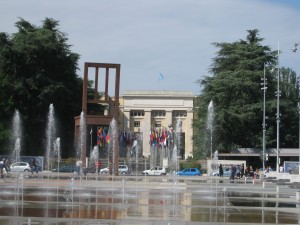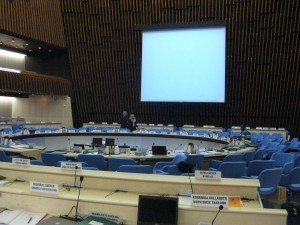There have been a great number of national commitments made and program initiatives created in order to achieve the MDGs. Many of these commitments, however, have not been fulfilled as evidenced by the current status of the MDGs. The U.N. itself does not have an international legal enforcement entity that enforces the agreements made as it is not a world government. Thus, ultimate responsibility for achieving the MDGs lies with the countries themselves rather than with the United Nations. In most instances, there are no legal ramifications against member states that do not fulfill their promises due to the fact that the MDGs are not a direct legal entitlement because the U.N. is not a world government and the Millennium Declaration is not a legally binding document. There are other indirect forms of enforcement, nonetheless, that obligate nations to fulfill its promises to guarantee the success of the MDGs because ultimately, the MDGs are a culmination of previous strived-for pledges that already have existing frameworks to ensure their achievement.
First, the U.N. Charter has empowered the Security Council with enforcement mechanisms, such as collective measures or military action, which it may use against countries that violate the Charter. For example, as is well known, war and poverty are inseparable tragedies that devastate national and regional economies, and deplete natural and human resources. In order to achieve the MDGs (particularly, MDGs 1, 3, 4, 6, 7 and 8), the Security Council may resolve to place arms embargoes on countries that engage in war to signal its disapproval of the war, and to limit the resources available to the violating actors. The Security Council has adopted resolutions that place arms embargoes on countries such as Sudan, Lebanon, the Democratic People’s Republic of Korea (North Korea), Sierra Leone, Iran, and Liberia.
Secondly, many international agreements incorporate the MDGs and legally compel member states that have ratified these agreements to fulfill their commitments in achieving the MDGs. For example, the U.N. Charter requires all member states to “fulfill in good faith the obligations assumed by them in accordance with the present Charter,” which includes responsibilities such as complying with the resolutions adopted by the Security Council and taking “action in co-operation with the Organization for the achievement of the purposes set forth in Article 55.” Because the MDGs represent a global commitment to basic human rights, the MDGs are encompassed in the legal obligations resulting from human rights treatises. For example, the Universal Declaration of Human Rights incorporates every MDG into its legal framework., particularly Article 25(1) of the Universal Declaration of Human rights which states that “[e]veryone has the right to a standard of living adequate for the health and well-being of himself and of his family, including food, clothing, housing and medical care and necessary social services, and the right to security in the event of unemployment, sickness, disability, widowhood, old age or other lack of livelihood in circumstances beyond his control.” The General Agreement on Tariffs and Trade (GATT) pertains directly to MDG 8 as it requires participants who have ratified this agreement to comply with the established trade rules which call for the gradual reduction of tariffs, duties, import quotas, and other trade barriers for goods, services, and intellectual property.
Thirdly, political pressure has always been a resourceful method to employ in holding governments and its officials accountable for their actions and promises; it ensures enforcement of laws made and agreements entered into. In some instances, governments receive political pressure from citizens, nongovernment organizations and civil society organizations that support its officials or certain issues and programs. The Global Call to Action against Poverty (GCAP) is a worldwide alliance of millions of citizens and thousands of NGOs, trade unions, civil society organizations and others that demand realization of the MDGs by calling upon world leaders to take action and “[c]hallenging the institutions and processes that perpetuate poverty and inequality across the world to defend and promote human rights, gender justice, social justice and security needed for survival and peace.” Since 2005, GCAP has been very successful in mobilizing over 221 million people around the world in the fight to end poverty, putting political pressure on politicians and world leaders by engaging in different campaigning tools including holding poverty hearings and speaking at notable international political meeting such as those held by the International Financial Institutions.
Lastly, there have been cases around the world in which plaintiffs have been awarded redress which also indirectly increase the success of the MDGs. The Social and Economic Rights Action Centre (SERAC) and the Centre for Economic and Social Rights (CESR) in New York petitioned to the African Commission on Human and People’s Rights alleging that the Nigerian Government violated human rights laws and the African Charter by condoning and participating in the production of oil without adequate monitoring and safety measures which has resultantly contaminated the environment and has caused environmental deterioration and community health concerns. It also alleges that the government attacked, burned, and destroyed several Ogoni villages when the villagers tried to defend their land and home. In 2001, the Commission found that the Nigerian Government violated the African Charter on Human and People’s Rights Articles 2, 4, 14, 16(1), 18(1), 21(1) and 24. The Commission appealed to the Nigerian Government to “to ensure protection of the environment, health and livelihood of the people of Ogoniland” by engaging in several acts, including: “[s]topping all attacks on Ogoni communities and leaders by the Rivers State Internal Securities Task Force and permitting citizens and independent investigators free access to the territory; [c]onducting an investigation into the human rights violations described above and prosecuting officials of the security forces, NNPC and relevant agencies involved in human rights violations; [and e]nsuring adequate compensation to victims of the human rights violations, including relief and resettlement assistance to victims of government sponsored raids, and undertaking a comprehensive cleanup of lands and rivers damaged by oil operations.”
In carrying out the principles set forth in its Charter, the United Nations strives to do so through the implementation and maintenance of the rule of law. The Millennium Development Goals exemplify this effort. Although the organization itself cannot legally require member states to achieve the MDGs, there are several legal means of enforcement to ensure that member states are performing the responsibilities agreed upon when each country ratified the U.N. Charter and other international agreements. With five years remaining before the deadline set for achieving the MDGs, it is crucial that these legal enforcement mechanisms are pursued in order to achieve the MDGs.



